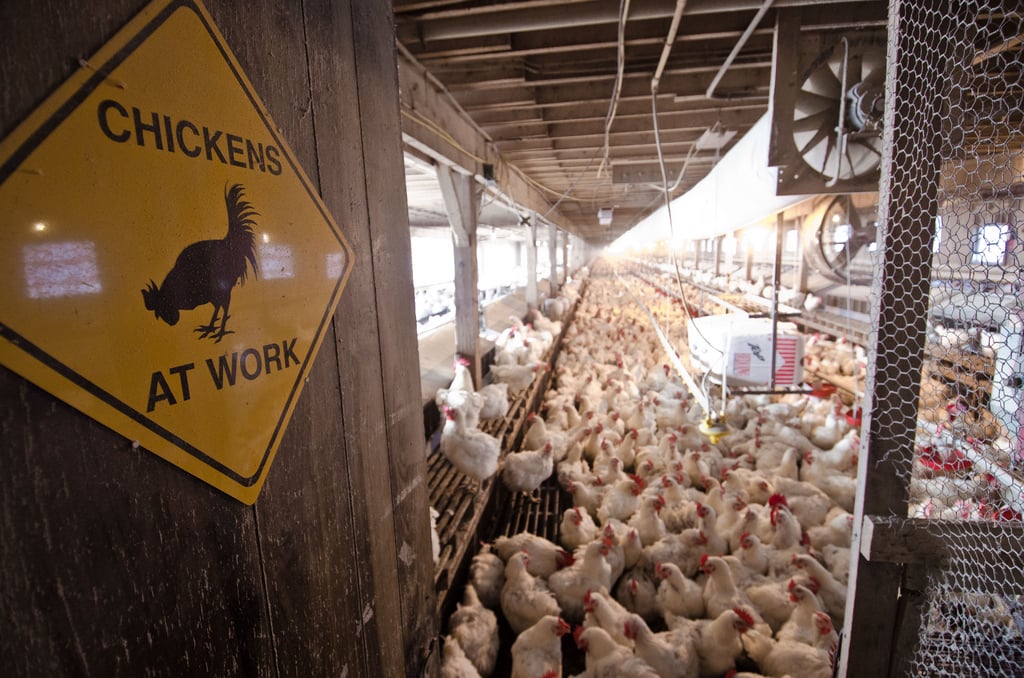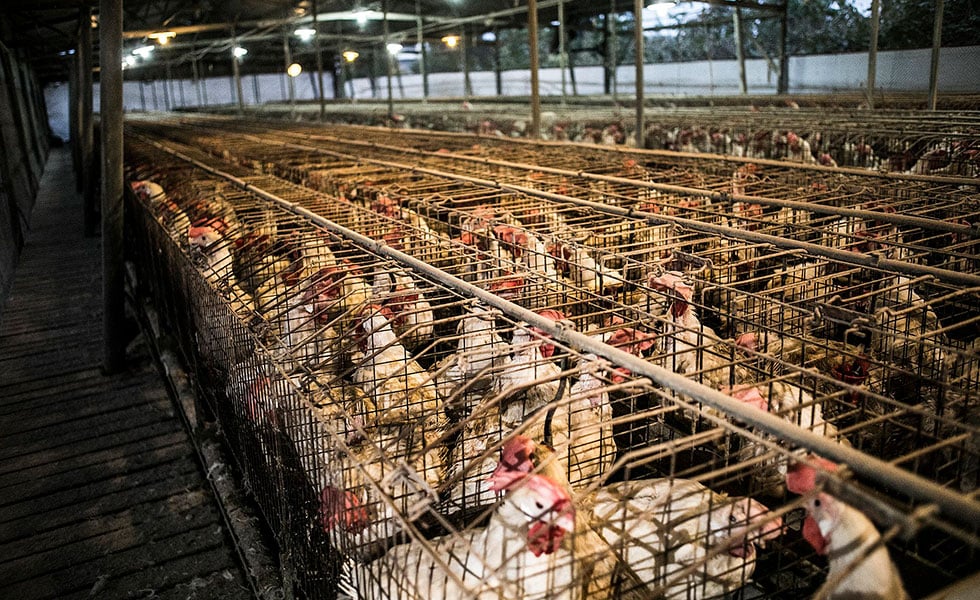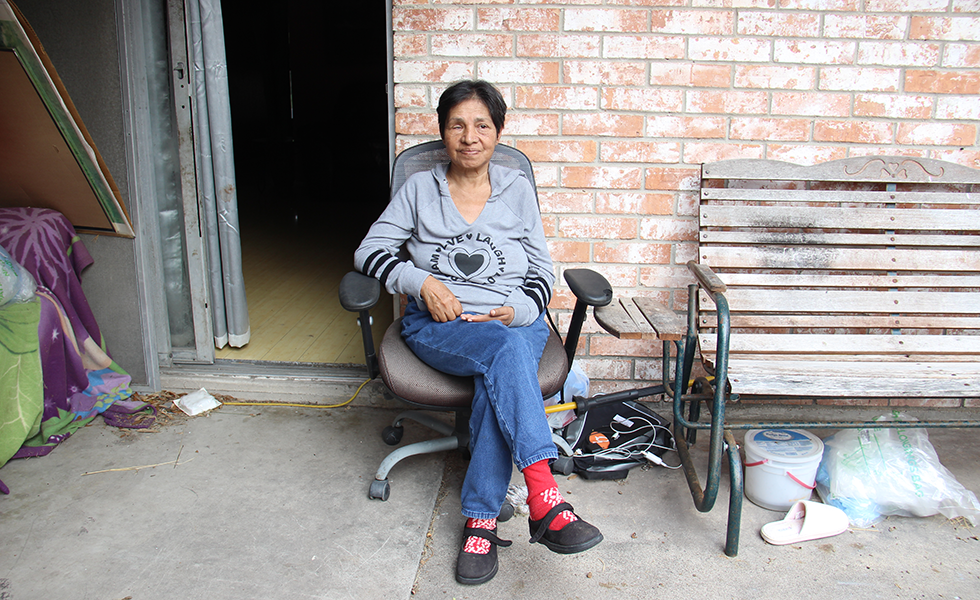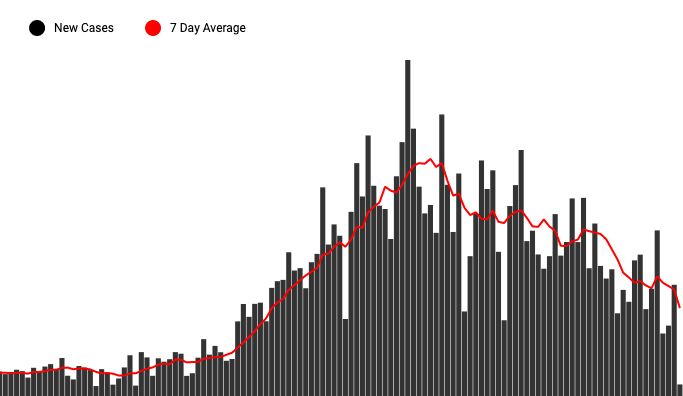
Workers at Tyson Poultry Plant in East Texas Say the Company Put Them at Risk of COVID-19
Tyson employees interviewed by the Observer say that as the coronavirus spread through the facility in April, the company failed to notify them of the danger in a timely manner so they could protect themselves.

Officials at Tyson’s poultry processing plant in Shelby County may have waited weeks to tell workers that an employee had tested positive for COVID-19, preventing other workers from taking action to prevent the spread of the virus inside the facility, plant employees told the Observer last week. The company waited even longer to implement rudimentary safeguards (such as breathing masks and plastic screens to separate workstations) as more workers fell ill, were hospitalized, and died, they say.
The Tyson plant emerged last week as a focal point for coronavirus cases in this rural county of 25,400 on the Texas-Louisiana border. The Tyson facility, which employs roughly 2,000 workers from Texas and Louisiana, has been linked to 56 cases of COVID-19, 33 of whom are Shelby County residents. Shelby County has the third-highest number of confirmed cases per capita of all Texas counties. The Texas Department of State Health Services is investigating the Tyson outbreak, along with a spate of coronavirus cases at a JBS slaughterhouse in Moore County in the Panhandle, which counts the highest number of cases per capita in the state.
Michael Bennett, a Tyson employee who tested positive for the virus in early April, says he left work one day this month with a cough and a fever. “I just couldn’t take it. I was weak and feeling real bad and just stayed at home,” he told the Observer. Bennett then sought treatment at the emergency room in the town of Center, the county seat, and received the diagnosis he was dreading: He had COVID-19. Bennett says he was sent to a nearby hospital, where hospital staff told Tyson about his test result, for more than a week. He’s since been released and is at home, where I reached him by phone on Thursday. Bennett can’t be sure how he picked up the virus, he says as his coughs punctuate our conversation, but he suspects he caught it at the plant.
The Observer has changed Bennett’s name, as well as the two other employees named in this story, after employees expressed concern that Tyson might retaliate against them for speaking to a reporter. The story also omits some details of employees’ positions within the plant and their medical histories to make them less identifiable. The extent to which the Tyson outbreak has contributed to COVID cases in this rural region is still unclear, partially because of a lack of reliable state data on infection rates and testing. It is clear, however, that some workers feel as if Tyson put profits over worker safety as the virus spread through the facility this month. If the company had distributed protective equipment earlier, “it probably wouldn’t be as bad as it is now,” Bennett says.
The employees say that approximately three weeks ago, a plant supervisor told workers that at least one employee had tested positive. But they shouldn’t worry, the supervisor reportedly said—the case had occurred two weeks earlier, so other workers likely wouldn’t be threatened. The announcement hit the workers like a bombshell. “I don’t think it was fair to us as employees the way they waited until 14 days later to tell us,” says Denise Richardson, who has not contracted the virus. “If you’ve got paperwork confirming that someone has it, you let everybody know and give us all an opportunity to take proper precautions.” At the time, the company had just recently begun to start screening workers by checking their temperature, and masks had not been widely distributed to employees, Richardson says.
By the time Tyson alerted employees to the danger, the virus already appeared to be spreading. Bennett, after days of “feeling sicker and sicker, weaker and weaker” at work, was hospitalized shortly after the announcement. Bobby Dawson, another Tyson employee, tested positive for COVID-19 about the same time as Bennett. He says he informed plant supervisors about the positive test result the same day he learned of it. Dawson criticized the company for not telling him about the situation sooner, which would have allowed him to take precautionary measures to keep from getting sick, such as taking days off work or wearing protective equipment. “They hid it from us. They didn’t give us a choice to do anything,” Dawson told the Observer. “Their main concern is to get them chickens out, regardless of what their employees are going through. That’s why we all come up sick.”
The conditions of the plant lend themselves to the spread of disease, the workers say. Employees work “elbow to elbow” as they defeather, eviscerate, and debone thousands of birds a day. Even the most innocuous task—such as clocking in for a shift and clocking out at the end of the day—appears to present considerable risk, as hundreds of employees crowd the few functional terminals. “You got so many people trying to clock in at one time you can’t do nothing but catch it,” Richardson says. “We’re packed in there like a bunch of sardines.”
Richardson also notes that many of the plant’s workers cross the border each day from Shelby County’s adjacent parishes in Louisiana, a state that’s been ravaged by the virus. Shelby County shares a border with DeSoto Parish, where at least 180 confirmed cases and 10 deaths have been counted among a population of only 27,000. Vehicle traffic into Texas from Louisiana has been restricted since an order issued in March by Governor Greg Abbott to slow the spread of coronavirus across state lines. But the Louisiana workers reportedly have been provided paperwork by Tyson that has allowed them to continue traveling back and forth for work despite the growing number of COVID-19 cases at the facility and in Shelby County, where the number of cases rose to 98 on Monday. The problem is so severe in Shelby County that the Texas National Guard was deployed there to ramp up testing last week.
Workers characterize the protective measures taken by Tyson during the outbreak as ineffective, misguided, and dangerous. For instance, in lieu of respiratory masks, employees resorted to wearing “beard guards”—simple plastic nets designed only to keep hair from getting in food—instead. Widespread distribution of face masks only occurred two weeks ago, they say. Days before the announcement at the Center facility, employees were herded into a line so their temperature could be taken. The long queue made social distancing impossible, and the individuals using thermometers wore no protective facewear, Richardson says. “We were less than a foot apart, maybe two, because the line was just that long,” she says. “And if you had a fever, they’d sit you down for a few minutes like it’s gonna go away that quick.”
Last week, Tyson announced it was temporarily shuttering the plant to install new equipment. The Facebook post made no mention of the outbreak, and the plant is expected to reopen on Tuesday. A Tyson representative has refused to say how many workers have tested positive for the coronavirus at the plant. The representative forwarded a video statement from the company’s vice president, who said without a hint of irony, “We believe information is the best tool for combating this virus.”
The company largely ignored a detailed list of questions sent by the Observer for this story. It did not attempt to refute or verify most of the assertions made by employees. The company did say, though, that when an employee tests positive for COVID-19, “We notify anyone who has been in close contact with the person.” A representative also said that “team members who have not been exposed,” along with supervisors, are notified in those instances.
Despite the risk, all of the workers I interviewed say they’ll likely go back to work when the plant reopens this week. They say they aren’t being paid while hospitalized or home sick with the virus and they have little savings to make ends meet. “I have no other choice. I gotta go back ’cause I got to pay the bills,” says Dawson, who added that his power provider has threatened to shut off his electricity unless he pays a $109 bill. “I’m gonna go in prepared, put my mask on, put my gloves on, and try to stay away from everybody,” he says.
Find all of our coronavirus coverage here.
Read more from the Observer:
-
State Employees Criticize Texas’ Uneven Approach to Worker Safety Amid COVID-19: A slow, patchwork response to COVID-19 has jeopardized worker safety for some of Texas’ lowest-paid public employees.
-
Tiger King Could’ve Told a Tough Story of the Legal Mistreatment of Animals, But It Didn’t: Netflix’s runaway hit is a salacious interpersonal drama that buried what could have been a hard-hitting exposé of the patchwork regulations that are failing to protect animal welfare and public safety.
-
Spinning Their Wheels: Dallas’ paltry public transit system makes owning a car all but required. So as the metroplex booms, many low-income residents are shut out of jobs and services they need.


